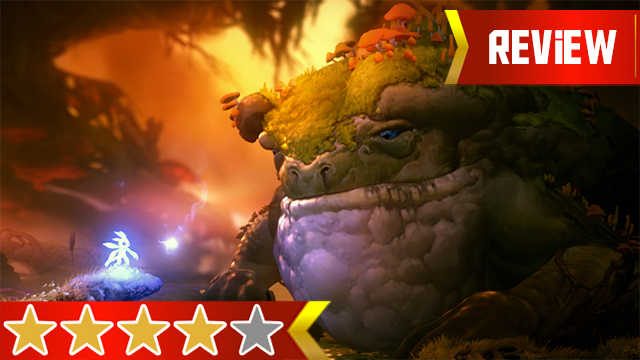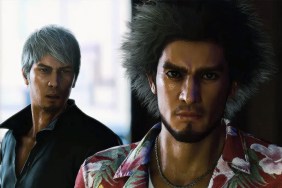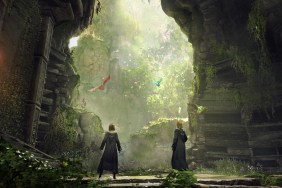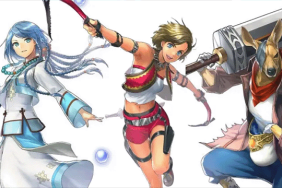Even though Metroidvania games are quite prevalent nowadays, Ori and the Blind Forest was still among the best when it came out in 2015. It had the requisite ability progression and litany of hidden collectibles, but its demanding platforming, vibrant art style, and tear-jerker of a story put it in the upper echelon of the packed genre. Because of that, ORI AND THE WILL OF THE WISPS has a high bar to leap over and even though it doesn’t clear said bar, it still lands with a decent amount of grace.
Ori and the Will of the Wisps Review | Devilish platforming
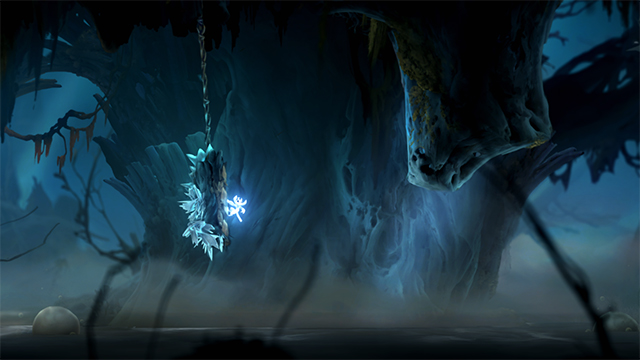
Will of the Wisps is still fundamentally a challenging platformer with an expanding arsenal of new moves like any true Metroidvania. You’ll start out merely double jumping over gaps before graduating to gliding over hazards while also air dashing, bouncing off projectiles, and grappling to certain points all in succession with only a tiny margin of error. It’s quite a ramp up that pushes back throughout its dozen hours, but grows along with you in a satisfying way. New side missions not only add some character to the world, but they also provide even more upgrades that further the progression even more and reward your curiosity and skill.
As you learn more and improve, the game gets more devious or cooks up new hazards and this constant pressure means that the gameplay doesn’t get repetitive. Responsive controls also ensure that you make these jumps and can survive these gauntlets if you have the reflexes. There may be the occasional weird physics bug that flings a platform out of reach and a few ledges with some odd, progress-stopping lips or curves, but Will of the Wisps is a fluid platformer that relies on its slick controls and pacing to create levels full of gratifying jumping puzzles that test you from beginning to end.
ALSO: Resident Evil 3 Remake Review | Seeing S.T.A.R.S.
The notorious escape sequences are emblematic of this and are still hard but not as ridiculously punishing as they were in the last title. Chaining together all of Ori’s moves is always a rush, even if the new abilities aren’t fully pushed to their limits or as inventive as they were last time around. The many similar dash-like moves are symbolic of this notion, but even if some of them are slightly disappointing and have limited uses, they’re still decent tools to have.
Ori and the Will of the Wisps Review | A hollowed, dead cell
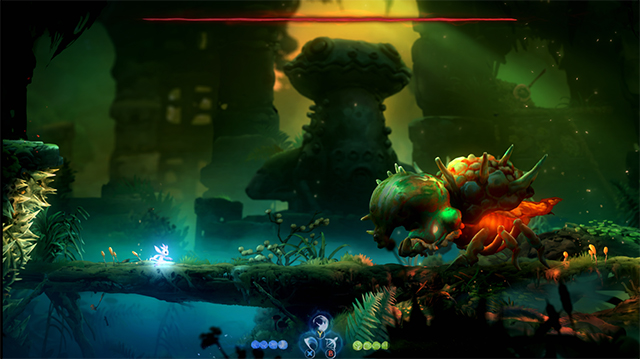
These many dashes don’t make combat any better. Fighting was very much an afterthought in Ori and the Blind Forest as the spark that attacked for you was as distant as it was boring. Will of the Wisps is much more physical and seems to have borrowed elements from Dead Cells and Hollow Knight with its flashier melee combat system.
But Will of the Wisps is only a surface-level imitation, failing to grasp at what truly makes those combat systems so engrossing. Animation canceling is basically non-existent as once you attack, you’re committed to the swing until it finishes. When done correctly, it can make attacks feel more devastating as there is a proper amount of risk and reward attached. But here, it limits how you can move and makes combat sluggish as a result as it consistently robs control from you.
Dodging is even worse as there are essentially zero (or very few) invulnerability frames. This makes your dash useless in many scenarios since you’ll often get clipped by an attack anyway, despite your evasive maneuver. Nimble and brutal enemies will punish a poor roll and the problem gets exponentially worse when roll right into them as you instantly take damage. It’s an annoying, nagging issue that most plainly points out why lacking i-frames is such a huge deal breaker.
This pair of problems coalesce into a lackluster combat system with almost none of the beauty of its platforming half. It’s clunky and not nearly as refined as the games it’s most clearly aping. Dead Cells, through its animation canceling and excellent dodge move, is a masterclass example of the benefits a polished fighting system that can elevate an entire game to classic status. Will of the Wisps, through misunderstanding those tenets, is a great example of how a game can pantomime its influences yet fail by skipping over the vital details.
Bosses make these shortcomings evident as it becomes clear that they often demand a level of combat acuity the game is ill-equipped to support. Each finds its own special way to point out the holes in the fighting mechanics before blowing them wide open with each and every cheap death. Many of them can be battles of attrition since you can heal, but they’re still painful slogs that are worse than any of the diabolical escapes from the first game.
Ori and the Will of the Wisps Review | Angelic art and animation
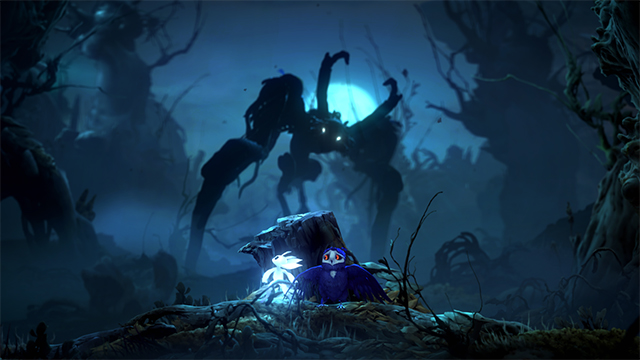
At least the bosses animate well and look absolutely incredible, but that’s not exclusive to those climactic battles. Ori and the Will of the Wisps is a stunningly gorgeous game at every turn. Environments are remarkably detailed and decorated with a whole swath of vibrant colors that extend all the way out to its awe-inspiring vistas that linger in the background. There’s a certain variety and richness to the palette that is the result of some exceptional art direction.
It looks as spectacular in motion, too. From its secondary characters to its aforementioned bosses, the animation is absolutely marvelous and is most apparent in the protagonist. Ori’s acrobatic moves squash and stretch and reflect the fluidity of the controls during gameplay, but also deftly convey emotion during the mostly silent cutscenes. Properly expressing action and the atmosphere through animation evokes a Disney-esque feel to the whole game, which is also backed up by its phenomenal soundtrack that wouldn’t sound out of place in an animated film from that mouse-eared company.
Ori and the Blind Forest‘s story drew comparisons to some Pixar movies and Will of the Wisps tries to strike a nearly identical tone with its narrative. Given these similarities, it still has the charming, wholesome nature that is directly carried over from its predecessor. It’s inoffensive, doesn’t interrupt the gameplay, and is still heartwarming in spots, but some of the parts are almost directly lifted from that effective first game. A small handful of surprises doesn’t override the fact that the story almost directly copies what came before and is more forgettable as a result, especially given the weak inciting incident.
The story helps point out how Ori and the Will of the Wisps is sort of a will o’ the wisp itself. It had almost an unattainable goal of trying to top the first entry that was a surprisingly tough yet satisfying platformer with a ton of heart. Will of the Wisps doesn’t jump as high as Ori and the Blind Forest and falls in a few extra pits yet it is still a worthy enough successor. Comparisons between the two are not always favorable to the sequel, especially considering how it repeats some of the same beats. But that same familiarity is also what gives Will of the Wisps its vivid art style and well-paced, difficult platforming that make both titles such noteworthy entries in the crowded Metroidvania genre.
GameRevolution reviewed Ori and the Will of the Wisps on PC with a copy provided by the publisher.
-
Tons of tough precision platforming that tests your reflexes.
-
Gorgeous art direction, lovely soundtrack, and fluid animation make for a cohesive package.
-
Progression is paced well due to side missions, collectibles, and story-based abilities.
-
Combat is floaty, imprecise, and has a lackluster evade move.
-
Bosses are cheap and push the controls past their limit.
-
Story and some of the powers aren't as new as they should be.
